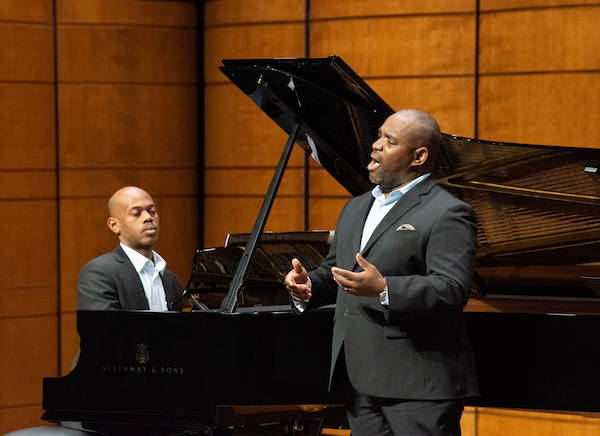Brownlee casts a wide net with songs spotlighting Harlem Renaissance poets

Lawrence Brownlee performed a recital with pianist Kevin J. Miller for Vocal Arts DC Sunday at the Kennedy Center Terrace Theater. Photo: Courtney Ruckman
Lawrence Brownlee crafted his latest recital around the theme of Harlem Renaissance poets. Vocal Arts DC presented this lengthy concert Sunday afternoon, with support from the Coalition for African Americans in the Performing Arts (CAAPA), in the Kennedy Center Terrace Theater. The American tenor and pianist Kevin J. Miller paired songs by composers of the past with others that Brownlee commissioned from a handful of living composers.
Not surprisingly, the largest number of composers on the program turned to the words of Langston Hughes. Robert Owens, an African-American composer who lived in Germany from 1959 until his death in 2017, created two brief cycles of Hughes songs. Brownlee opened with Desire, which featured the forceful playing of Miller at the keyboard, an arresting style that matched well with the singer’s vibrato-rich intensity. Both musicians gave these compact songs lyric edge, especially the whirring uneasiness of “Juliet” and the calm evenness of “Man.”
The other Owens set, Silver Rain, felt more varied in tone, with enigmatic mystery in “Night Song” and the aphoristic charm of both “Silence” and “Songs.” Brownlee reined in that buzzing vibrato to create a whispered hush in “Silence,” although he seemed more tentative at times. Potent, confident high notes rang out in the final song, “Sleep,” bolstered by the oscillating accompaniment from Miller.
Three songs by Jeremiah Evans revealed a basically tonal harmonic palette with some surprising twists, as well as a pleasing melodic style. The best was “Southern Mansion,” an eerie evocation of life and death on a plantation, set to a striking poem by Arna Bontemps. An ostinato bass rumbled threateningly every couple measures, and bluesy touches crept in with the descriptions of music from the mansion mingling with the “tinkling” of the chains of slavery.
The most accomplished set on the first half was Songs of the Seasons, composed by the Chicago-born Margaret Bonds on the poetry of Langston Hughes, with whom she became close after moving to New York. The lilting pulse of “Poème d’Automne” and the static barrenness of “Winter Moon” made a jarring contrast with the Debussy-like harmonic turns in “Young Love in Spring” and the heroic fortitude of “Summer Storm”
On the second half, three “Vocalises” by Carlos Simon each introduced a segment of the program. “Vocalise I” felt the most traditional, with Ravel-influenced harmonic colors in the piano’s undulating figuration and Brownlee’s luscious legato tone on the vowel “Ah,” up to a long, gorgeous high note. “Vocalise II” hovered lovingly over harmonic progressions familiar from gospel music, with poignant dissonances. “Vocalise III” felt the most original, breaking away from the sole vowel “Ah” to other rapid sounds (“Manna mana” or “ha ha ha”). A rollicking accompaniment rounded out the sense of antic interplay.
Songs by four Millennial composers added considerable variety. Jasmine Barnes’ “Peace,” with poetry by Georgia Douglas Johnson, took Brownlee on some forays into his beautifully placed head voice. Her “Invocation” gave a complex rhythmic undergirding to Claude McKay’s plea to be inspired by an Ancestral Spirit, with a pulsating beat in irregular meter, at one point with the feel of a habanera.
Syncopation enlivened two songs by Brandon Spencer, who disrupted the middle section of “I Know My Soul” with Stravinsky-like bitonal clusters. The driving bass line of “The Dance of Love,” set to a fervent poem by Countee Cullen, established a pleasing groove, with the pianist providing some of the energy you would otherwise get from a drum kit.
Three songs by Damien L. Sneed featured more gospel influences, especially in the plangent song “To America.” In a line that may have given this recital its name (“Rising”) the poet, James Weldon Johnson, asks his country “How would you have us? Rising or falling?” Reversing the order in the program, Brownlee ended the set with the rousing “The Gift to Sing,” with its catchy irregular rhythms and high vocal writing.
The most far-flung musical style came in Shawn Okpebholo’s “Romance,” a sort of hybrid of atonality, Messiaen-like bird calls, and blue notes. Brownlee, who noted that these younger composers had pushed him into his high range repeatedly, soared sweetly in his high falsetto range, one of his strengths. Two Joel Thompson songs turned the mood more somber, especially “Compensation,” on a dark poem by Paul Laurence Dunbar.
Thompson’s “My People,” returning to the poetry of Langston Hughes, offered a sweeping climax to this wide-ranging recital. The text, an ecstatic ode, ended by praising “Singers and dancers, dancers and laughers,” with a hilarious vocalise on laughing syllables, which crescendoed up to a pealing high note. Two spiritual encores, the enthusiastic “Come by Here, Good Lord” and the mellow “Angels Watching Over Me,” closed the concert in an air of meditative repose.
Soprano Elisabeth Llewellyn and pianist Simon Lepper perform songs by Coleridge-Taylor, Elgar, Vaughan Williams, Stanford, and Mahler 7:30 p.m. April 17. vocalartsdc.org
